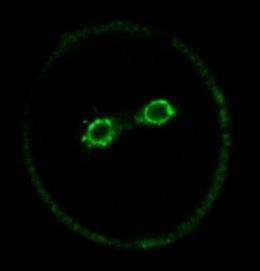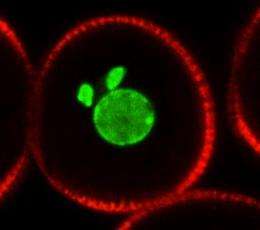Plant biologists discover gene that switches on 'essence of male'

Biologists at the University of Leicester have published results of a new study into plant sex - and discovered that a particular gene switches on 'the essence of male'.
The study takes to a new level understanding of the genes needed for successful plant reproduction and seed production.
Professor David Twell and colleagues in the Department of Biology at the University of Leicester reported the discovery of a gene that has a critical role in allowing precursor reproductive cells to divide to form twin sperm cells.
Their study is reported in the journal Public Library of Science Genetics (PLoS Genetics) and was funded by the Biotechnology and Biological Sciences Research Council (BBSRC).
Professor Twell said: "Flowering plants, unlike animals require not one, but two sperm cells for successful fertilisation. One sperm cell to join with the egg cell to produce the embryo and the other to join with the central cell to produce the nutrient-rich endosperm tissue inside the seed. A mystery in this 'double fertilisation' process was how each single pollen grain could produce the pair of sperm cells needed for fertility and seed production.

"We now report the discovery of a dual role for DUO1, a regulatory gene required for plant sperm cell production. We show that the DUO1 gene is required to promote the division of sperm precursor cells, while at the same time promoting their specialised function as sperm cells. It effectively switches on the essence of male.
"We show that DUO1 is required for the expression of a key protein that controls cell division and for the expression of genes that are critical for gamete differentiation and fertilisation.
"This work provides the first molecular insight into the mechanisms through which cell cycle progression and gamete differentiation are coordinated in flowering plants.
"This knowledge will be helpful in understanding the mechanisms and evolution of gamete development in flowering plants and may be useful in the control of gene flow and crossing behaviour in crop plants."
The researchers also report on the presence of genes closely related to DUO1 in a wide variety of flowering plants and even in lowly land plants such as moss, which suggests that DUO1 may be part of an ancient sperm cell regulatory network that evolved even before pollen and flowers appeared on the scene.
Interestingly, DUO1 is also related to a super class of Myb regulator proteins also present in animals that have an important role in controlling cell proliferation and that are implicated in certain human cancers such as leukemias. So like animal cell Myb proteins, DUO1 is needed for control of cell proliferation, but DUO1 is distinguished by its specific role in plant reproduction, namely its dual role in sperm cell production and switching on their ability to fertilize.
Professor Twell added that the study could help to unravel the evolutionary origins of plant sperm cells and provide new molecular tools for the manipulation of plant fertility and hybrid seed production - as well as to control gene flow in transgenic crops where the male contribution may need to be eliminated.
Source: University of Leicester


















